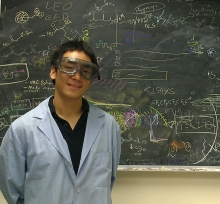
University:
University of California Santa Barbara
Major:
Chemical Engineering
Mentor(s):
Delia J. Valles
Faculty Sponsor(s):
Juan C. Noveron
Faculty Sponsor's Department(s):
Chemistry and Biochemistry
Project Title:
Novel Biomass Conversion to Solar Cell Products
Project Description:
Harvesting the energy from the Sun to produce electricity using devices with renewable, low-cost components is an important step towards sustainability in the 21st Century. Existing solar cells comprise expensive components such as single-crystal silicon or ultra-fine synthetic chemical compounds, which although allow for modest efficiencies, they involve high production costs that thwart their wide-spread application. Our goal is to develop a novel method to convert agriculturally-derived biomass into the key components of organic solar cells. Ideally, this would enable far-remote villages to make their own solar cells on-site using readily available agricultural products or even grass. To achieve this goal, we applied the Kraft process to New Mexico’s Red Chile plants (sp Capsicum) and extracted high-molecular weight lignin bio-macromolecules with high efficiency. The Red Chile plant is a fast-growing plant that has an annual production of over 110,000 metric tons and propagates in arid climates. Using anaerobic, free-radical-induced methods, we converted lignin to polycyclic aromatic hydrocarbons (PAH) products, which are well-known to be excellent charge carriers in organic solar cells. We are currently investigating methods to make alkylated derivatives of the bio-derived PAHs in order to introduce self-organizing properties to render them as n-type components in organic solar cells. The biomass conversion process, characterization, and photovoltaic properties of the renewable PAH derivatives will be presented.
